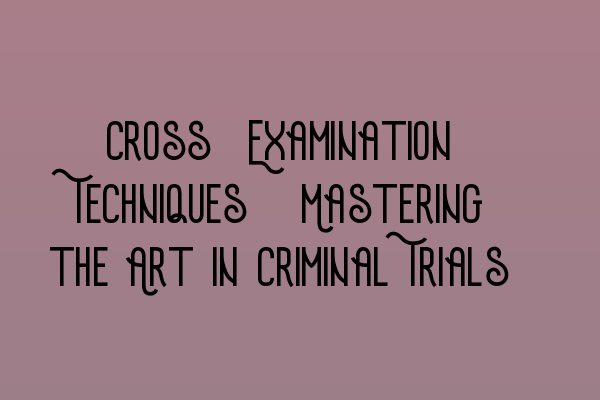Cross-Examination Techniques: Mastering the Art in Criminal Trials
Cross-examination is a critical aspect of criminal trials. It is during this phase of the trial that the defense has the opportunity to challenge the prosecution’s evidence and discredit the witnesses. Mastering the art of cross-examination can make all the difference in the outcome of a criminal case. In this article, we will explore a few key techniques that can help solicitors become more effective in cross-examining witnesses.
1. Preparation is Key
Before stepping into the courtroom, it is essential to thoroughly prepare for cross-examination. Familiarize yourself with all the facts and evidence of the case, review the witness statements, and identify potential weaknesses or inconsistencies. Take the time to create a cross-examination strategy and outline the specific points you want to address.
2. Establishing Credibility
During cross-examination, it is crucial to establish credibility with the jury and undermine the credibility of the witness. Ask questions that challenge the witness’s memory, perception, or knowledge of the events. Look for any inconsistencies in their statements and highlight them. By doing so, you can create doubt in the jury’s mind about the witness’s reliability.
3. Control the Narrative
Take control of the cross-examination by asking leading questions. This allows you to control the witness’s responses and limit their ability to provide unhelpful information. Instead of asking open-ended questions, frame your questions in a way that requires a simple “yes” or “no” answer. This strategy helps you keep the focus on the points you want to emphasize.
4. Use Impeachment Techniques
Impeachment techniques can be powerful tools in cross-examination. Look for prior inconsistent statements made by the witness and confront them with those statements. Explore any biases or motives the witness may have that could influence their testimony. Additionally, be prepared to challenge the witness’s character or reputation if relevant to the case.
5. Stay Calm and Objective
Cross-examination can sometimes become emotionally charged, especially when dealing with hostile witnesses. However, it is critical to remain calm and composed throughout the process. Avoid getting into arguments or losing your temper, as it can undermine your credibility with the jury. Stay focused on the facts and objective in your questioning.
6. Know When to Stop
Knowing when to stop your cross-examination is just as important as knowing how to start it. If you have achieved your objectives and discredited the witness’s testimony, it may be best to conclude your cross-examination on a strong note. Excessive questioning can give the witness an opportunity to clarify or rectify any damaging statements.
In conclusion, mastering the art of cross-examination is a skill that every solicitor should strive to develop. By adequately preparing, establishing credibility, controlling the narrative, using impeachment techniques, staying calm, and knowing when to stop, solicitors can effectively challenge witnesses and strengthen their clients’ defense in criminal trials. For further resources and preparation materials, check out our related articles:
- SQE 1 Practice Exam Questions
- SQE 1 Practice Mocks FLK1 FLK2
- SQE 2 Preparation Courses
- SQE 1 Preparation Courses
- SRA SQE Exam Dates
